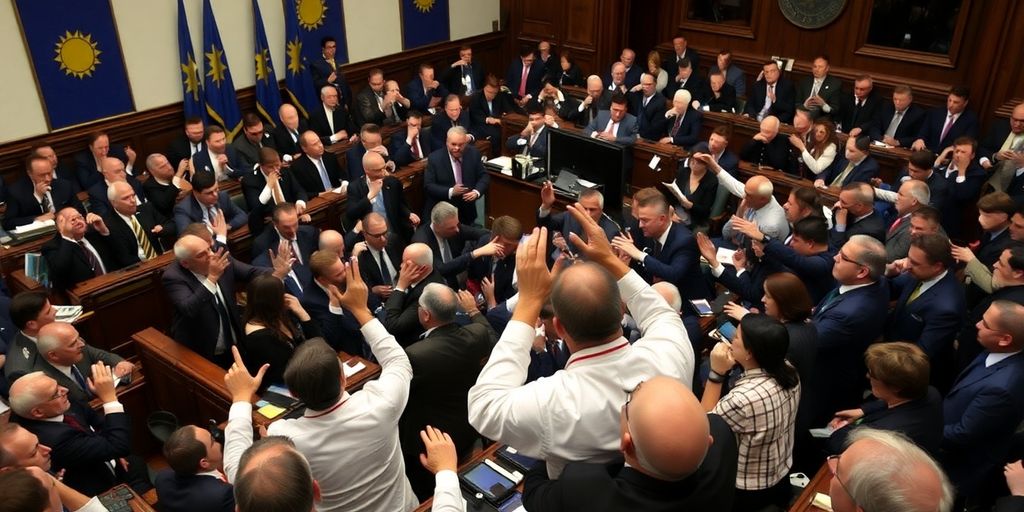The political landscape in Kosovo has been thrown into disarray following the collapse of the inaugural session of the newly elected parliament. This unexpected turn of events has delayed the formation of a new government and raised the specter of a snap election, as the ruling party struggles to secure a coalition amid fierce opposition.
Key Takeaways
- Kosovo’s parliament session was suspended due to opposition protests over constitutional violations.
- Prime Minister Albin Kurti’s party, Vetevendosje, won 48 seats but lacks a majority.
- The opposition parties have ruled out forming a coalition with Kurti, complicating government formation.
- A failure to establish a government could lead to early elections and prolonged political instability.
Background of the Political Crisis
In the recent parliamentary elections held on February 9, 2025, Prime Minister Albin Kurti’s left-wing party, Vetevendosje, emerged as the largest faction, securing 48 out of 120 seats. However, this victory was not enough to achieve a majority, which is crucial for forming a stable government.
The inaugural session of the parliament was marred by chaos as opposition members accused Kurti and his cabinet of failing to resign in accordance with constitutional requirements. Despite Vetevendosje distributing a letter of resignation, the acting speaker canceled the session, leading to a potential legal impasse.
The Opposition’s Stance
The opposition, which includes the Democratic Party of Kosovo (PDK), the Democratic League of Kosovo (LDK), and the Alliance for Kosovo’s Future (AAK), has firmly ruled out any coalition with Kurti. This decision stems from deep-seated political animosities, with Kurti previously labeling opposition members as "animals" and "thieves" during his victory speech.
- Democratic Party of Kosovo (PDK): Secured 24 seats, unwilling to partner with Vetevendosje.
- Democratic League of Kosovo (LDK): Won 20 seats, also ruled out a coalition.
- Alliance for Kosovo’s Future (AAK): Holds 8 seats, similarly opposed to Kurti.
Implications of the Deadlock
The failure to form a government not only jeopardizes Kosovo’s political stability but also complicates ongoing normalization talks with Serbia, which have been stagnant for years. The EU and the United States have urged both parties to adhere to previous agreements, including the establishment of an Association of Serb-Majority Municipalities in Kosovo.
If Kurti cannot secure the necessary votes to form a cabinet, the president may turn to other parties to attempt a coalition. However, if no viable government can be established, Kosovo may face early elections, further prolonging the political uncertainty.
Conclusion
As Kosovo navigates this political crisis, the future of its governance remains uncertain. The inability to form a coalition government could lead to significant ramifications for the country’s economy and its international relations, particularly with Serbia and Western allies. The coming weeks will be critical in determining whether Kosovo can stabilize its political landscape or if it will plunge into further turmoil.
Sources
- Kosovo Hits Political Deadlock as Parliament Session Collapses, Bloomberg.com.
- Kosovo risks post-election deadlock as parties rule out coalition, Reuters.
- What’s Behind The Growing Number Of Muslim-To-Catholic Conversions In Kosovo, Worldcrunch.
- Kosovo’s parliament faces post-election deadlock after opposition blocks
minority ruling party, WRAL.com. - Kosovo’s parliament faces post-election deadlock after opposition blocks minority ruling party, The Washington Post.






